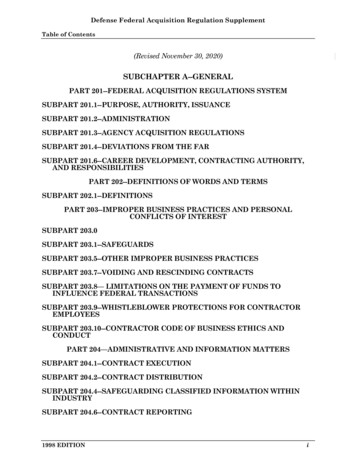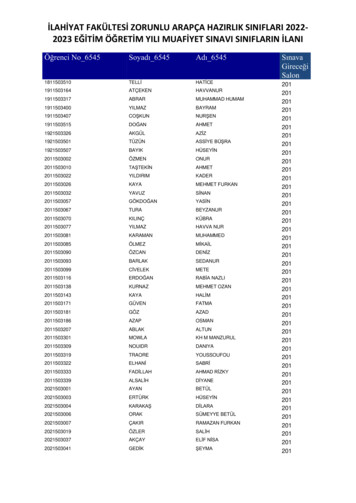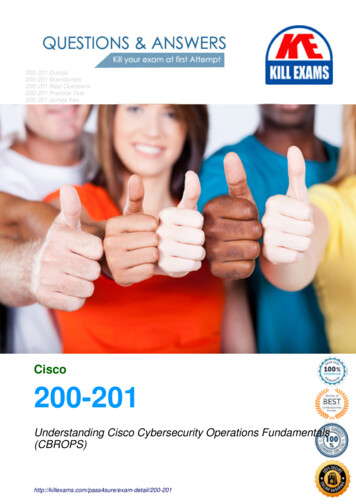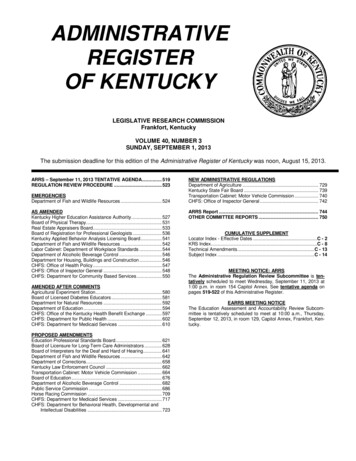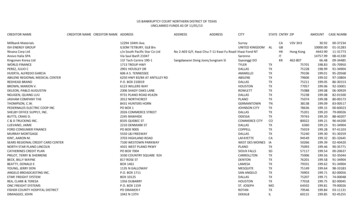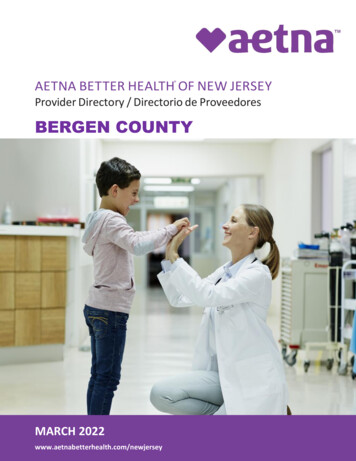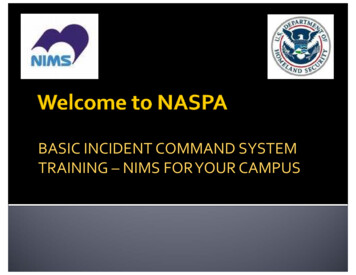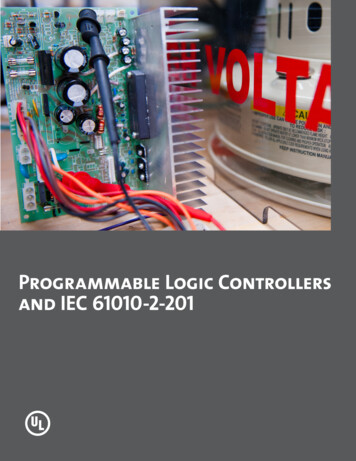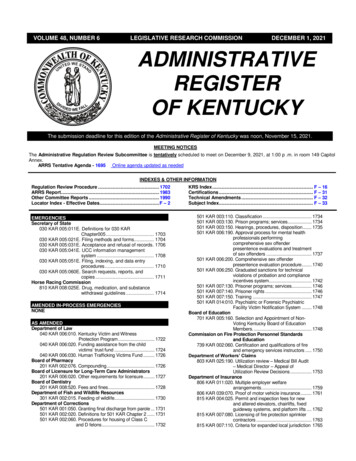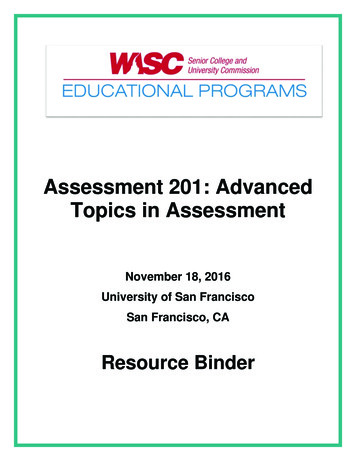
Transcription
Assessment 201: AdvancedTopics in AssessmentNovember 18, 2016University of San FranciscoSan Francisco, CAResource Binder
An Opportunity for Your Institution to Develop Assessment Expertise and LeadershipMarch 2017 - January 2018Applications will be accepted November 15, 2016 - February 15, 2017Purpose of the AcademyThe WSCUC Assessment Leadership Academy (ALA) prepares postsecondary professionals to provide leadership ina wide range of activities related to the assessment of student learning, from facilitating workshops and supportingthe scholarship of assessment to assisting administrative leadership in planning, budgeting, and decision-makingrelated to educational effectiveness. ALA graduates have also provided consultation to the WSCUC region andserved on WSCUC committees and evaluation teams; some have moved on to new positions with greaterresponsibilities. The Academy curriculum includes both structured and institutionally-tailored learning activitiesthat address the full spectrum of assessment issues, and places those issues in the national context of highereducation policy on educational quality, accreditation, and accountability.Who Should Participate in the Academy?Higher education faculty, staff, and administrators who are committed to: Developing assessment expertise; Serving in an on-going assessment leadership role at their institution; Devoting significant time to complete ALA reading and homework assignments.Assessment Leadership Academy FacultyALA participants will interact with and learn from nationally-recognized higher education leaders. Faculty leadinteractive class sessions and are available to participants for one-on-one consultations.Faculty Facilitators of the ALA: Amy Driscoll, Former Director of Teaching, Learning, and Assessment, CSU Monterey BayCarole Huston, Associate Provost, University of San DiegoGuest Faculty Include: Peter Ewell, President Emeritus, National Center for Higher Education Management SystemsAdrianna Kezar, Associate Professor for Higher Education, University of Southern CaliforniaJillian Kinzie, Associate Director, Center for Postsecondary Research & NSSE InstituteKathleen Yancey, Kellogg W. Hunt Professor of English, Florida State UniversityLaurie Dodge, Vice Chancellor of Institutional Assessment and Planning, Brandman University (ALAAlum)Kevin Grant, Assistant Dean of Student Development, Biola University (ALA Alum)Susan Platt, Executive Director of Assessment, CSU Long Beach (ALA Alum)And others!Learning GoalsParticipants who complete Academy requirements will acquire foundational knowledge of the history, theory, andconcepts of assessment; they will also develop expertise in training and consultation, institutional leadership forassessment, and the scholarship of assessment.Application Deadline and More InformationApplications for the 2017-18 cohort will be accepted from November 15, 2016 until February 15, 2017.For more information and application materials, please see Assessment Leadership Academy on the WSCUCwebsite http://www.wascsenior.org/ala/overview
Assessment 201: Advanced Topics in AssessmentNovember 18, 2016 University of San FranciscoSan Francisco, CATable of ContentsSchedule2University of San Francisco Map3Facilitator Biographies4Attendee Directory5Aligning Direct and Indirect Assessment Strategies with Outcomes [Amy Driscoll]7 Direct Assessment: Blending Teaching, Learning, and Assessment8 Indirect Assessment (Probing for Understanding)27 Aligning Student Evidence with LO’s, Inquiry, Curriculum33Reliability and Validity when Using Rubrics [Mary Allen]42Developing Quality Evidence [Amy Driscoll]51 Quality Evidence: Principles, Characteristics, and RecommendationsEngaging Faculty in Assessment [Mary Allen and Amy Driscoll]5257 Guides for Engaging Faculty in Assessment58 Engaging Faculty in Assessment Homework60Closing the Loop [Amy Driscoll]64Integrating Best Practices into the Design and Reporting of Assessments [Mary Allen]69Additional Resources74 A Collection of Literature and Online Resources75 WSCUC Assessment Rubrics81 WSCUC Core Competency FAQs91 WSCUC Meaning, Quality, and Integrity of Degrees FAQs94 Principles for Effective Assessment of Student Achievement96 From Departmental To Disciplinary Assessment: Deepening Faculty Engagement (Pat Hutchings)98 Levels of Assessment (Ross Miller & Andrea Leskes)106 Beyond Compliance: Making Assessment Matter (George D. Kuh, Stanley O. Ikenberry, Natasha A.Jankowski, Timothy Reese Cain, Peter T. Ewell, Pat Hutchings and Jillian Kinzie)125WSCUC Assessment Community of Practice Information131WSCUC Educational Programs132LiveText133Assessment Leadership Academy 2017-20182017 WSCUC Academic Resource ConferenceInsideCoverBackCover1
Assessment 201 Advanced Topics in Assessment8:30AM-5:00PMNovember 18, 2016University of San FranciscoWorkshop Learning OutcomesAs a result of participating in Assessment 201, workshop participants will be able to:1. Design direct and indirect assessments that align with outcomes.2. Assess the quality of rubrics.3. Calibrate reviewers and check for inter-rater reliability.4. Develop quality evidence.5. Engage faculty in assessment.6. Close the loop with multiple strategies of inquiry and decision making.7. Integrate best practices into the design and reporting of assessments.Workshop Schedule28:00 – 8:30 amArrival and Registration8:30 – 8:40 amWelcome, Introductions, and Overview of Workshop (Melanie Booth)8:40 – 10:20 amAligning Direct and Indirect Assessment Strategies with Outcomes(Amy Driscoll)10:20 – 10:35 amBreak10:35 – 12:05 pmReliability and Validity when Using Rubrics (Mary Allen)12:05 – 12:50 pmLunch12:50 – 1:20 pmDeveloping Quality Evidence (Amy Driscoll)1:20 – 2:30 pmEngaging Faculty in Assessment (Mary Allen and Amy Driscoll)2:30 – 2:45 pmBreak2:45 - 3:30 pmClosing the Loop (Amy Driscoll)3:30 – 4:50 pmIntegrating Best Practices into the Design and Reporting ofAssessments (Mary Allen)4:50 – 5:00 pmImplementation Ideas and Insights
MeetingroomMain CampusCOFRGIGLHHHRKAMCMGMHPHSIULUCCowell HallFromm HallGillson HallGleeson LibraryHayes-Healy HallHarney Science CenterKalmanovitz HallMcLaren Conference CenterMemorial GymnasiumMalloy HallPhelan HallSaint Ignatius ChurchUlrich Field & Benedetti DiamondUniversity CenterPARKINGLone Mountain CampusLHLMLMNLMPLMRLVSTTCUNLoyola HouseMain Bldg/Classrooms/Study HallLone Mountain NorthPacific WingRossi Wing/AdministrationLoyola VillageStudio TheaterTennis CourtsUnderhill BuildingROTC/Upward BoundSchool of LawKNZLLKendrick HallDorraine Zief Law LibraryKoret Health & Recreation CenterKOKoret CenterSchool of EducationEDPTSchool of EducationUSF Presentation Theater281 MasonicMA281 MasonicOffice LocationsAcademic and Enrollment ServicesLone Mountain MainAcademic Support ServicesGleeson Lower Level, 20Admission OfficeLone Mountain MainAlumni OfficeLone Mountain Rossi Wing, 112Arts and Sciences, College ofHarney, 240AthleticsMemorial Gym, Lower LevelBookstoreUniversity Center, Lower LevelCareer Services CenterUniversity Center, 5th FloorCounseling CenterGillson, Ground FloorEducation, School ofTurk at Tamalpais, 107Financial AidLone Mountain MainIntercultural CenterUniversity Center, 4th FloorInformation Technology ServicesLone Mountain North, 2nd FloorInternational Student andScholar ServicesUniversity Center, 5th FloorKoret Health and Recreation CenterCorner of Parker and StanyanLaw Library, Dorraine ZiefCorner of Fulton and ColeLaw, School ofCorner of Fulton and ShraderLoyola House/Jesuit CommunityLone Mountain, 2600 Turk StreetManagement, School ofMalloy Hall, 244One CardLone Mountain Main, 130One Stop Enrollment andFinancial ServicesLone Mountain Main, 250Nursing and Health Professions,School ofCowell, 102Public SafetyUniversity Center, 310Registrar’s OfficeLone Mountain Main, 250Residence LifeUniversity Center, 5th FloorStudent Leadership and EngagementUniversity Center, 4th FloorStudent Disability ServicesGleeson Lower Level, 203
Assessment 201: Advanced Topics in AssessmentLead FacilitatorsMary J. AllenMary J. Allen, Ph.D. is a consultant in higher education, specializing inassessment and accreditation. She is the former director of the CaliforniaState University Institute for Teaching & Learning and a professor emeritaof Psychology from California State University, Bakersfield. Mary haspublished books on the assessment of academic programs and generaleducation, and she has offered assessment presentations and workshopsat AAHE, AAC&U, SACS, and WASC conferences. She is a sought afterspeaker, consultant, and workshop presenter and has worked with over150 colleges, universities, and college systems.Email: mallen23@csub.eduAmy DriscollAmy Driscoll was former director of teaching, learning, and assessment atCalifornia State University, Monterey Bay, where she developed aninstitutional approach to outcomes-based education. Prior to that sheserved as the director of community/university partnerships at PortlandState University, where she initiated community-based learning andcommunity Capstones. She has presented at AAC&U conferences and theNational Assessment Institute and has mentored more than 60 institutionsin assessment. Her books include Taking Ownership of Accreditation:Processes That Promote Institutional Improvement and FacultyEngagement (Driscoll & Cordero de Noriega, 2006), and From Outcomesbased Assessment to Learner-centered Education (Driscoll & Wood, 2007)Email: amym.driscoll@comcast.net4
Attendee DirectoryAssessment 201: Advanced Topics in AssessmentUniversity of San Francisco, San Francisco, CANovember, 18 2016First NameLast NameJob TitleInstitutionEmailEllenBurkeFaculty - Landscape ArchitectureCal Poly San Luis PhelanAcademic Assessment DirectorCal Poly San Luis ObispoJoshMachamerDept Chair, Member, Academic Assessment CouncilCal Poly San Luis Obispojmachame@calpoly.eduMarcHorneyAnimal Science FacultyCal Poly San Luis Obispomhorney@calpoly.eduSeanHurleyAgribusiness FacultyCal Poly San Luis Obisposhurley@calpoly.eduDawnJankeDirector, Writing and Rhetoric CenterCal Poly SLOdjanke@calpoly.eduJenniferNguyenStudent Center for Academic Achievement DirectorCalifornia State University East California State University, te Dean of AssessmentCalifornia University of Science and Medicineettarhr@calmedu.orgTinaKandakaiExe. Director Development and AssessmentCharles R. Drew istant to the Dean of StudentsDharma Realm Buddhist Universitythao.phi@drbu.orgStevenSchapiroDean for Academic Affairs, and ALOFielding Graduate tutional Assessment CoordinatorHawaii Community Collegereshelad@hawaii.eduJaronHightower-MillsIR and Assessment AdministratorInternational Technological itutional Research AnalystJohn F. Kennedy Universitykmclemore@jfku.eduHelenaSimonProject Coordinator Program AssessmentJohn F. Kennedy Universityhmarsala@jfku.eduPamelaZimbaAssistant Professor of LawJohn F. Kennedy Universitypzimba@jfku.eduLisaHuttonProfessor and Chair, Legal Studies DepartmentJohn F. Kennedy Universitylhutton@jfku.eduMatthewBruceProject Director of Program AssessmentJohn F. Kennedy Universitymbruce@jfku.eduLauraPalazzoloDeanLincoln Law School of San Josedean@lincolnlawsj.eduLauraAlipoonDepartment ChairLoma Linda Universitylalipoon@llu.eduLeoRanzolinAssociate Dean, School of ReligionLoma Linda Universitylranzolin@llu.eduCarmanWimsattAssessment ConsultantLos Angeles Community College Districtwimsattcy@gmail.comElizabethSturgeonMount Saint Mary's Universityesturgeon@msmu.eduBruceMatthesAssessment Committee Co-Chair & Associate Professor ofEnglishDirector of Integrative StudiesNewSchool of Architecture & h Language Program CoordinatorNewSchool of Architecture and DesignCarmenFernandezPresidentNorthern Marianas rianas.eduJacquelineCheDirector of Institutional EffectivenessNorthern Marianas tment Chair, BusinessNorthern Marianas Collegechavel.green@marianas.eduPaulChoiExecutive Vice PresidentNorthwestern Polytechnic Universitypaul.choi@npu.eduNellyMangarovaChief Academic OfficerNorthwestern Polytechnic ccidental Collegebrighous@oxy.eduOccidental Collegeerogers2@oxy.eduEsterRogersAssociate Dean, Social Sciences / Core Curriculum and StudentIssues; Professor, Phill/Cog PsyDirector of Institutional Assessment and AccreditationEllieKaucherVice President of Academic AffairsPhillips Graduate Universityekaucher@pgu.eduMaryCoffeyAssociate Dean of the CollegePomona Collegemcoffey@pomona.edu
Attendee DirectoryAssessment 201: Advanced Topics in AssessmentUniversity of San Francisco, San Francisco, CANovember, 18 2016First NameLast NameJob TitleInstitutionEmailBenSandersExecutive DirectorReach Institute for School t Mary's College of Californiafsweeney@stmarys-ca.eduSarah BethDempseySaint Mary's College of Californiasdd4@stmarys-ca.eduAliceBaldridgeSaint Mary's College of Californiaamb19@stmarys-ca.eduAeleahSoineSaint Mary's College of Californiaahs3@stmarys-ca.eduJonasWrightAssociate Dean, Academic AffairsSan Francisco Conservatory of Musicjwright@sfcm.eduJenniferSwansonSan Francisco State Universityjmpeters@sfsu.eduJulianavan OlphenAssociate Director, Writing Across the Curriculum/Writing in theDisciplineDirector, Writing Across the Curriculum/Writing in the DisciplineSan Francisco State Universityjvo@sfsu.eduElaineCollinsAssociate Dean College of ScienceSan Jose State or of Computer Science and Director of AssessmentSan Jose State r of Academic AffairsSaybrook am DirectorSaybrook Universitytjackson@saybrook.eduNamiKimAssistant ProvostSaybrook Universitynkim@saybrook.eduDevorahCurtisDirector of Mentoring/Director of MS MBM ProgramSaybrook ierra rofessor - Agriculture, SLO AssistantSierra ssor - Humanities, SLO AssistantSierra rSierra essment SpecialistStanislaus Stateelittlepage@csustan.eduGabrielaRomoStudent Learning Outcomes Assessment ManagerUniversidad de Las emic Programs ManagerUniversity of San Diegolopezja@sandiego.eduTracyBenningAssociate Professor, Environmental ScienceUniversity of San nt Professor of EconomicsUniversity of San retchenCoffmanAssistant Professor of Environmental ScienceUniversity of San FranciscoXavierGomezSr. Instructional DesignerUniversity of San Franciscoxgomez@usfca.eduChristineYoungAssociate Professor, Performing Arts & Social Justice ProgramUniversity of San Franciscocyoung8@usfca.eduShawnCalhounAssociate DeanUniversity of San rofessor of MusicUniversity of San ofessor of StatisticsUniversity of the r an and Student Success CoordinatorWeimar weimar institutercelestine@weimar.eduGeorgeArayaEducation Department Chairweimar institutegaraya@weimar.eduTeriSalvadorDirector of Student Servicesweimar institutetsalvador@weimar.eduGlennHillProfessor of ReligionWeimar Instituteghill@weimar.eduFlaviaJorgePsychology Department ChairWeimar InstituteInstitutelmfjorge@yahoo.com
Aligning Direct andIndirect AssessmentStrategies with OutcomesAmy Driscoll7
Amy DriscollMany traditional examples(tests/exams, cases, projects,performances, essays, tasks,simulations, practicum/internships Signature Assignments Portfolios Capstones Reflections 8
A generic task, problem, case, or project thatcan be tailored or contextualized in differentdisciplines or course contexts.Signatures are defining characteristics thatreveal thinking or practices (Shulman, 2005).Signature assignments have the potential tohelp us know whether student learningreflects “the ways of thinking and doing ofdisciplinary experts”. Course-embeddedassessment Well aligned with LO’s Authentic in terms ofprocess/content, “real world”application May include reflection Collaboratively designed byfaculty9
Ingeneral education whenmultiple courses meet commonrequirements and shared LO’s –provides a common data set toenable documentation of generaleducation LO’s being met.When multiple sections of the samecourse are offered by multiplefaculty with varied pedagogy –enables programs to collectcommon data across the coursesections for program evaluationand review at both graduate andundergraduate levels.10
WhenInstitutional LearningOutcomes (ILO’s) are met invaried programs and departmentsacross the institution – provides acommon data set which enablesthe institution to determinewhether graduates are meetingthe ILO’s Foruse in a foundational courseon a grad or undergrad level,like PSY 500 or Intro toComputer Science to check thatstudents are prepared withprerequisite understandings andskills for success in the coursesthat follow within the program.11
1.2. Faculty review one or more of theagreed upon targeted learningoutcomes and come to a commoninterpretation of them.Faculty use the learning outcomes tobrainstorm possible and alignedtasks, problems, examples, authenticproblems. (these are oftensuggested within the outcomes)EX. Students analyze a issue frommultiple perspectives and form a personalposition of agreement/support or action.Possible tasks:Articulate and analyze an issueIdentify sources of perspectivesDescribe multiple perspectivesDevelop a position statement12
Kinds of calinternationalpolitical3. First draft of the assignment is intentionallygeneric (in context) to allow for multipledisciplines and contexts.4. Assignment is tailored for varied course ordisciplinary contexts.5. All faculty users agree to the use and tocollaborative review of student work samples.6. Faculty engage in conversations aboutexpectations in student work, preferably designa rubric.13
14Promote faculty discussions of studentlearning, pedagogy, assessment (culture oflearning)Provides significant common data sets todocument program or institutional impactEngages students in important learningactivitiesGuides pedagogy especially practice forlearningHas potential for application or transfer toanother department or institution forinformative comparisonsRequire time for developmentMay be translated as rigid or confining ofcurriculum or pedagogyRequires faculty agreement
LO Students design management systems thatinclude staffing, budget, evaluation,organization, and strategic plan. NON-PROFITCOMMUNITY STUDIES, EDUCATIONADMINISTRATIONLO Students develop needs assessments,analyze data, and design community-basedresponses to the findings. PUBLIC HEALTH,SOCIAL WORKLO Students collaborate to produce public artthat reflects community context. ART MEDIA,MULTICULTURAL STUDIESClear educational purpose (not repositories)Students’ participation in selecting contentsusing faculty selection criteriaRegularly evaluated with established criteriaIllustration of growthContinual updatingStudent reflection with potential for synthesisand metacognition15
16For almost any learning experience at bothundergraduate and graduate levelsEspecially appropriate for courses andprograms focused on thinking skills and ondeveloping synthesis and metacognitionFor courses and programs with smallnumbers of studentsFor self-designed programsIt helps students and faculty to look atlearning holistically – to see connections – topresent a composite of different kinds oflearning.It goes beyond achievement of outcomes andlooks at learning over time.It encourages students to be actively involvedin their learning.
It promotes diversity of assessment and canbe a rich focus for discussion amongstudents and faculty.It provides in-depth information forfaculty/staff use in revising courses andprogramsPortfolios require a great deal of time.Portfolios demand careful planning andgradual implementation.Contents of portfolios can be an issue interms of no. of items, length of items, etc.Storage of portfolios is also an issue.Analysis of portfolios as evidence of programsuccess can be time consuming.17
18Cambridge, Cambridge, & Yancey (2009).Electronic Portfolios 2.0 Stylus PublishingT. P. Light, Helen Chen, & John Ittleson.(2012) Documenting learning in E-portfolios:A guide for college instructors. Jossey-BassLinda Suskie (2009) Assessing studentlearning: A common sense guide, 2nd edition.Jossey-Bass See Chapter 13.Offered or required in ¾ of U. S. baccalaureateinstitutionsDiscipline-based Capstones are most commonformatEmergence of Capstones as a senior experiencein the late 1980’s and early 1990’sCalls for assessment that is synthetic, holistic,interdisciplinary and reflective of national goalsThe Boyer Commission (1998) recommendedcapstones for higher education curriculumResponse to the LEAP initiatives to providetransformational experiences
Capstones are a summarizing process with bothlearning and assessment integrated in theproject, problem solving, report, etc. (multipleforms); at graduate level in the form of thesesCapstones are best coordinated, implemented,and evaluated by collaborative groups (all faculty,teams of faculty, employers, community reps,students, alum, etc.)Actual Capstones are designed by students withinput from multiple directions.Arises from program or institutional missionand/or stated program or institution goalsShaped in a way that both assesses andextends the learning of program or institutionJudged or evaluated by a set of outcomesthat are aligned with programmatic orinstitutional goalsDesigned or conducted to be a high-impactpractice for student learning***19
For a programmatic or disciplinary Capstone,the prerequisite is a credible, sustained, andcoherent program with a solid core to bereflected in the Capstone For an interdisciplinary or institutionalCapstone, there must be broad connectionsbetween academic majors and thegoals/values of the general educationprogramNOTE: The interdisciplinary Capstone is morechallenging for both faculty and students. Intentionality Collaboration CurricularFit Professional Standards20
Functions within distinct cultural andorganizational contexts at all levels Practical issues like identifying stakeholders,analyzing resources, admissions and entryrequirements, course length, enrollment size,and course descriptionPortland State University Example todemonstrate the decisions. While Capstone formats or approaches maydiffer, all Capstone courses “will be informed bythe following expectations”: Demonstrated student initiative Significant preparatory work Active inquiry Integration of acquired knowledge and skills Culmination of previous academic work(Schermer & Gray, 2012)21
Must be a creative, inquiry-based learning experience thatdeepens the student’s knowledge and integration of thediscipline. Must be part of an upper-division course of at least 4 unitsand (preferably) taught by ladder faculty. May be completed individually or by a group, provided eachstudent’s contribution is significant, identifiable, and graded. Must culminate in a tangible product that can be archived(electronically) by the department or program for three years. Must be opportunities for students to share capstone projectswith peers; this can occur in class or outside of class.(Lindholm, 2012) Provide opportunities for self-assessment, peerassessment, and assessment by multiplefaculty/staff/community representatives/employers with shared standards, rubrics, etc.Develop simple and iterative progress reportingmechanisms for monitoring work, learning,relationships, engagement, potential for successConsider a hierarchical set of activities thatincentivize more capable students(Hauhart & Grahe, 2015, p. 197)22
Robert Hauhart & Jon Grahe (2015)Designing and teaching undergraduatecapstone courses. Jossey-Bass.B. Catchings (2004). Capstones and quality:The culminating experience as assessment.Assessment Update, 16 (1), 6-7.G. Roberts & T. Pavlak (2002). Designing theMPA capstone course: A structured-flexibilityapproach. Journal of Public Affairs Education,8 (3), 179-191.The reflective process is a majorcomponent of learningReflection provides an opportunity formaking meaning (with new information,ideas, experiences, skills, etc.)May take place individually and/or incommunity with peersMay take oral, written, graphic or otherforms23
24Reflection on the information, curriculumcontent, topics, experiences - substantivewriting or discussion aimed at processing andrevealing understandingReflection on the learning process itself –personal – focused on the learner’s learningexperience with attempts to identify thesignificance, value, meaning of theexperienceBrief or abbreviated form – one minute paper,muddiest point paper (Angelo & Cross’ CATS)Intermediate form – extended and ongoingover course or program; passed back andforth with other; primarily journals, learninglogsExtended form – a component of a portfolio,blends both foci, integrative, may address thelearning experiences of one course, programor the entire college experience.
Content of learning – what have you learned?Context of learning – How does your learningfit in the larger context of life?Learning process – What have you learnedabout how you learned?(Wlodkowski, 1999)Continuous – an ongoing coherent processConnected – integrates past and currentexperiences, experiences with coursecontent, concepts acrosscurriculum/disciplines, and works toempower learners with knowledge about theirlearning25
26Challenging – poses new questions andunfamiliar, even uncomfortable ideas forconsideration, while simultaneously providingsupportContextualized – extends to application ofknowledge and understandings, may be oralor written.The DEAL Model (describe, examine,articulate, and learn) from Ash & ClaytonEyler, J., Giles, D., & Schmiede, A. (1996). A practitioner’s guide toreflection in service learning. Nashville, TN: Vanderbilt UniversityFink, D. L. (2003). Creating significant learning experiences: Anintegrated approach to designing college courses. San Francisco, CA:Jossey-Bass.Ash, S.L., & Clayton, P. H. (2009a). Generating, deepening, anddocumenting learning: The power of critical reflection in appliedlearning. Journal of Applied Learning in Higher Education, 1, 25-48.Ash, S. L., & Clayton, P. H. (2009b). Learning through critical reflection:A tutorial for service-learning students (instructor’s version).Morrisville, NC: East Coast Digital Printing.Brooks, E., Harris, E., & Clayton, P. H. (2010). Deepening appliedlearning: An enhanced case study approach. Journal of Applied Learningin Higher Education, 55-76.*Wlodkowski, R. (1999). Enhancing adult motivation tolearn: A comprehensive guide for teaching all adults. SanFrancisco, CA: Jossey-Bass.
Amy Driscoll Takes inquiry beyond questions of whetherstudent learned or were successful to WHY?HOW? WHEN?Pushes for information about how learningoccurred, confidence in learning, students’perceptions of their own learning and success.Extends interactions related to and discussionsof learningCommunicates to students that their opinionsand issues are importantCan yield unexpected or unanticipatedinformation.27
28Assignment and course gradesRetention and graduation ratesAdmission rates to other institutionsAlum perceptionsStudent self-ratings of their learningEmployer satisfactionAwards, honors, scholarshipsEmployment rates of grads (includingsalaries, positions, etc.) Surveys Interviews Focus Groups
Determine purpose for survey – goals,issues, inquiryCarefully plan for how data/informationwill be used***Determine the population for the surveyby identifying the individuals who willhave the information being soughtSample size will be influenced by type ofinformation needed, use of theinformation, and population of interestSelect type of survey format that will best providethe intended information (frequency, rating scales,open-ended questions, checklist)Carefully design survey questions Avoid confusing or vague wording with clear,straightforward questions Avoid wording that might bias response Allow respondents to not answer questions Watch for order effects (Allen, 1995, 2004)Pilot test the survey before use29
30Determine purpose for interview – goals,issues, inquiryBe clear about how you will use theinformation/data from the interviewsSelect kind – structured (SI), semistructured (SSI) , or unstructured (UI)Develop a brief introductory protocol toexplain purpose, structure, etc. and useuniformly for each interviewUse care to not indicate your personal viewsPlan careful questions and do not interpretthe questions (SI)For probing, begin with topics and questions,and allow the interviewee to vary content andflow (SSI)Determine no. of interviewees using thecriteria of “sufficiency” and “saturation”(Se
Matthew Bruce Project Director of Program Assessment John F. Kennedy University mbruce@jfku.edu Laura Palazzolo Dean Lincoln Law School of San Jose dean@lincolnlawsj.edu Laura Alipoon Department Chair Loma Linda University lalipoon@llu.edu Leo Ranzolin Associate Dean, School of Religion Loma Linda University lranzolin@llu.edu
